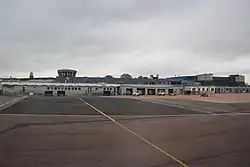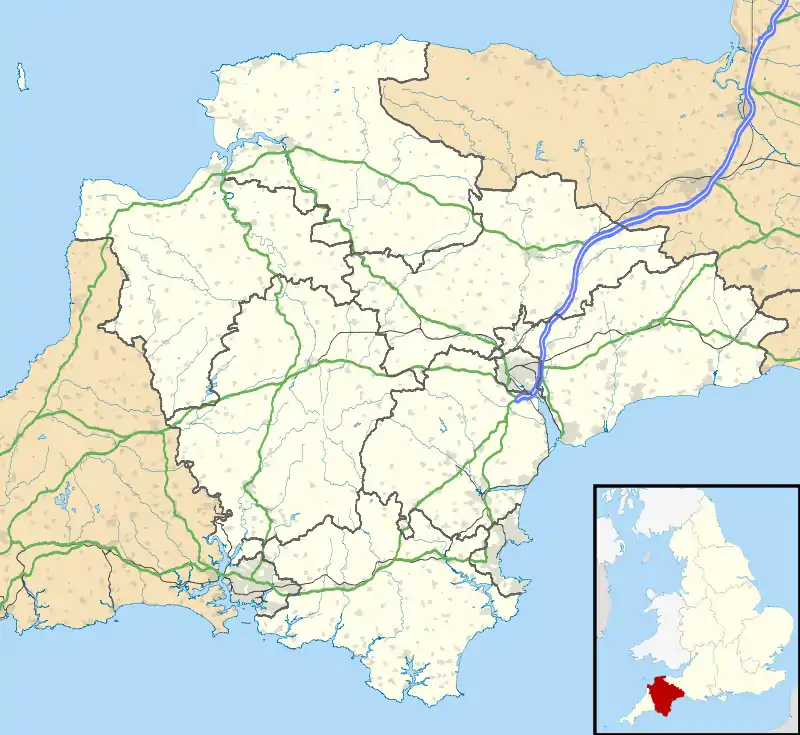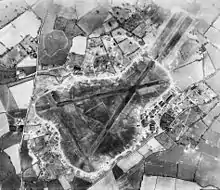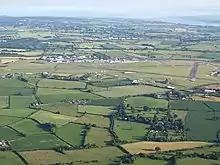Exeter Airport
Exeter Airport (IATA: EXT, ICAO: EGTE), formerly Exeter International Airport, is an international airport located at Clyst Honiton in East Devon, close to the city of Exeter and within the county of Devon, South West England. In 2007, the airport handled over 1 million passengers per year for the first time, although passenger throughput subsequently declined, recovering to 931,000 passengers in 2018.[1]
Exeter Airport | |||||||||||
|---|---|---|---|---|---|---|---|---|---|---|---|
 | |||||||||||
 | |||||||||||
| Summary | |||||||||||
| Airport type | Public | ||||||||||
| Operator | Regional & City Airports | ||||||||||
| Serves | Devon, Cornwall, Somerset, Dorset | ||||||||||
| Location | Clyst Honiton, Devon | ||||||||||
| Focus city for | N/A | ||||||||||
| Elevation AMSL | 102 ft / 31 m | ||||||||||
| Coordinates | 50°44′04″N 003°24′50″W | ||||||||||
| Website | www | ||||||||||
| Map | |||||||||||
 EGTE Location in Devon | |||||||||||
| Runways | |||||||||||
| |||||||||||
| Statistics (2019) | |||||||||||
| |||||||||||
Exeter has a CAA Public Use Aerodrome Licence (Number P759) that allows flights for the public transport of passengers or for flying instruction. The airport offers both scheduled and holiday charter flights within the United Kingdom and Europe.
In 2019, passenger numbers once again passed the 1 million mark, due in part to Ryanair operating several new flights to/from the airport.[2] However, due to the collapse of Flybe, which accounted for over 80% of the airport's passenger traffic, on 5 March 2020, passenger numbers are likely to decline sharply in 2020.
Location
Exeter Airport is located 4 miles (6.4 km) east of the city of Exeter and is approximately 170 miles (270 km) west south west of London. To the south, it is connected by the A30 dual carriageway which can be accessed from the east and the M5 in the west, just 1.5 miles (2.4 km) away. The M5 enables links to Bristol and the Midlands. There is no railway station at the airport. The closest, Cranbrook, is 2.2 miles (3.5 km) miles away by road. There is also a bus link to Exeter St Davids railway station, and a taxi service from Exeter for £30.
History
Exeter Airport was situated on land acquired by Exeter Corporation by compulsory purchase. It was leased and operated by Straight Corporation who also set up the Exeter Aero Club. The airfield officially opened on 31 May 1937 and operated from a "tented" terminal before the permanent buildings were complete.[3] Jersey Airways immediately inaugurated a summer service of eight flights per week from Jersey in de Havilland DH.84 Dragons. Railway Air Services ran connecting flights on to Plymouth and Bristol.
Wartime use

In World War II, RAF Exeter was an important RAF Fighter Command airfield during the Battle of Britain. RAF Exeter was used by the United States Army Air Forces (USAAF) Ninth Air Force as a D-Day troop transport base with Douglas C-47 Skytrain transports dropping paratroops near Carentan to land on the Normandy Beachhead. It was known as USAAF Station AAF-463.
Two brass plaques on the wall near the airport's observation lounge commemorate the activities of 3 squadrons of the Polish Air Forces in France and Great Britain that were based at Exeter during World War II, and commend their actions in defence of the city of Exeter.
Battle of Britain
RAF Exeter was home to the following Squadrons of No 10 Group during the Battle of Britain:
- No. 213 Squadron from 18 June 1940
- No. 87 Squadron from 5 July 1940
- No. 601 Squadron from 7 September 1940
Despite efforts at camouflage, including painting the runways, Exeter attracted the Luftwaffe and administrative and technical buildings were destroyed.[3]
USAAF use
Exeter met the requirement of basing USAAF troop carrier groups close to where units of the 101st Airborne Division were located and within reasonable range of the expected area of operations.
440th Troop Carrier Group

The 440th Troop Carrier Group arrived on 15 April 1944, with over 70 C-47/C-53 Skytrain aircraft. There was insufficient hardstandings to accommodate all the aircraft so many had to be parked on the turf, some areas being supported by tarmac. The 440th was a group of Ninth Air Force's 50th Troop Carrier Wing, IX Troop Carrier Command. The 98th TCS remained at Exeter until 7 August, when it began operating from RAF Ramsbury. On 11 September, the headquarters of the 440th TCG was established at the group's new base at Reims, France (ALG A-62D), and the last of the air echelon left Exeter two days later.
Postwar use
Walruses of an RAF air-sea rescue flight were the next tenants and these were joined by a glider training unit early in 1945. Post-war, Exeter was reclaimed by Fighter Command and a French Supermarine Spitfire squadron, No. 329, which came and stayed until November 1945. Meteors and Mosquitos made a brief appearance the following spring. No. 691 Squadron's target-towing Vultee A-31 Vengeances, which had been present for more than a year, proved to be the last RAF flying unit of the Second World War period based at Exeter. When No. 691 Squadron departed in the summer of 1946, the station was made available for civil use, being officially transferred to the Ministry of Civil Aviation on 1 January 1947, although there was still some reserve RAF activity until the 1950s.
Scheduled services to the Channel Islands began in 1952 and charter flights to various locations followed. A new terminal building was opened in the early 1980s and various other improvements, including a runway extension, were carried out over following years to establish Exeter as an important airport in the West Country. Exeter was a joint RAF/Civil airfield in the 1960s.
On 5 January 2007, a majority share of the airport was sold by Devon County Council to Regional and City Airports Ltd, a consortium led by construction firm Balfour Beatty. On 26 June 2013, the airport was bought by the Patriot Aerospace division of Rigby Group, which also owns Coventry Airport.[4]
In August 2016, Exeter Airport recorded their highest passenger throughput in a single month since September 2008, with 100,374 passengers passing through its terminal. New services to Glasgow and the first route to be supported by the new Government Regional Air Connectivity fund to Norwich, contributed to a 19% increase in passenger numbers during the month of August.[5] During 2018, the runway was resurfaced and energy-efficient LED lighting installed.[6]
In 2019, the airport was ranked fourth in the UK by Which? magazine of 30 airports for customer satisfaction, with a score of 73%.[7]
Accidents
On 19 January 2021, a West Atlantic Boeing 737-400 freighter having just performed flight NPT-05L from East Midlands Airport made a very hard landing at Exeter Airport, causing many creases in the fuselage. The aircraft seems to be written off.[8]
Airlines and destinations
The following airlines operate regular scheduled, seasonal, and seasonal charter flights to and from Exeter:
| Airlines | Destinations |
|---|---|
| Aer Lingus Regional | Belfast–City[9] |
| Aurigny | Guernsey[10] |
| Blue Islands | Jersey,[11] Manchester[12] |
| Isles of Scilly Skybus | Seasonal: Isles of Scilly |
| Loganair | Aberdeen,[13] Edinburgh,[14] Glasgow (begins 28 March 2021),[15] Newcastle upon Tyne[16] |
| Ryanair | Alicante, Málaga |
| TUI Airways[17] | Lanzarote Seasonal: Corfu, Dalaman, Gran Canaria, Heraklion, Ibiza (resumes 4 May 2022),[18] Larnaca, Menorca, Palma de Mallorca, Paphos, Rhodes, Tenerife–South, Zakynthos Seasonal charter: Chambéry[19] |
Other users
- Corporate aviation services including a private lounge are provided by XLR Aviation[20]
- There is one flight training organisation based at the airport: Aviation South West,[21] which offers a range of training from the Private Pilot Licence to the Commercial Pilots Licence and Instrument Rating.
- Devon Air Ambulance and National Police Air Service (NPAS) share a purpose built facility on the northern side of the airfield, having vacated the police headquarters at Middlemoor, Exeter in 2014.[22]
Statistics


The 25 busiest routes by air passenger numbers are listed below. As of March 2020 many of these routes, which were operated by Flybe, are no longer in operation.
| Rank | Airport | Total passengers | Change 2017 / 18 |
|---|---|---|---|
| 1 | 129,947 | ||
| 2 | 52,725 | ||
| 3 | 51,719 | ||
| 4 | 50,016 | ||
| 5 | 48,076 | ||
| 6 | 45,493 | ||
| 7 | 41,240 | ||
| 8 | 39,905 | ||
| 9 | 38,877 | ||
| 10 | 38,103 | ||
| 11 | 37,380 | ||
| 12 | 36,955 | ||
| 13 | 36,722 | ||
| 14 | 35,957 | ||
| 15 | 35,587 | ||
| 16 | 30,761 | ||
| 17 | 29,722 | ||
| 18 | 23,685 | ||
| 19 | 18,824 | ||
| 20 | 15,684 | ||
| 21 | 13,445 | ||
| 22 | 12,055 | ||
| 23 | 11,640 | ||
| 24 | 10,631 | ||
| 25 | 9,259 |
See also
References
- "Aircraft and passenger traffic data from UK airports". UK Civil Aviation Authority. Retrieved 29 January 2020.
- "New Ryanair flights". Exeter Airport. 2 April 2019.
- "RAF Exeter". South West Airfields Heritage Trust. Retrieved 6 March 2020.
- "Exeter International Airport sold to Rigby Group PLC". BBC News. 27 June 2013. Archived from the original on 2 July 2013. Retrieved 27 June 2013.
- "Best month for passenger numbers in 8 years". Exeter Airport. 31 October 2016. Archived from the original on 13 November 2016. Retrieved 31 October 2016.
- "Resurfacing and new lighting for runway". Exeter Airport. 3 November 2017. Archived from the original on 1 May 2019. Retrieved 1 May 2019.
- Oliver Smith, Digital Travel Editor. "Revealed: Britain's best and worst airports". The Telegraph. Retrieved 9 September 2019.
- News, UK Aviation (20 January 2021). "West Atlantic 737 seriously damaged in landing incident at Exeter". UK Aviation News. Retrieved 25 January 2021.
- "6 new routes from Belfast City Airport". Aer Lingus Group DAC. Retrieved 23 July 2020.
- "New Routes | Aurigny - Guernsey's Airline". www.aurigny.com.
- "Blue Islands secures Birmingham and Exeter routes for Jersey passengers". Blue Islands. 7 March 2020.
- "Blue Islands schedules new routes launch in late-August 2020". routesonline.com. 10 July 2020.
- "Loganair set to fly from Exeter for the first time". Exeter Airport. 9 June 2020.
- "Loganair Secures Key UK Air Services". www.loganair.co.uk.
- "Our timetable". Loganair.
- "Rival airline snaps up former Flybe routes from Exeter Airport". 5 March 2020. Retrieved 5 March 2020.
- "Flight Timetable". tui.co.uk.
- https://www.tui.co.uk/flight/timetable
- "Cheap Ski Flights - Flights Only With Crystal Ski". www.crystalski.co.uk.
- XLR. "Exeter". XLR. Retrieved 13 April 2020.
- "Flight Training & Flight Experiences in Exeter". Aviation South West. Retrieved 13 April 2020.
- "New helicopter base for Devon police and air ambulance service". Exeter Express & Echo. 12 May 2014. Archived from the original on 13 May 2014. Retrieved 12 May 2014.
- "Airport Data 2018". UK Civil Aviation Authority. 3 March 2018. Tables 12.1(XLS) and 12.2 (XLS). Archived from the original on 13 March 2017. Retrieved 14 April 2019.
- Freeman, Roger A. (1978) Airfields of the Eighth: Then and Now. After the Battle ISBN 0-900913-09-6
- Maurer, Maurer (1983). Air Force Combat Units of World War II. Maxwell AFB, Alabama: Office of Air Force History. ISBN 0-89201-092-4.
 This article incorporates public domain material from the Air Force Historical Research Agency website http://www.afhra.af.mil/.
This article incorporates public domain material from the Air Force Historical Research Agency website http://www.afhra.af.mil/.
External links
 Media related to Exeter International Airport at Wikimedia Commons
Media related to Exeter International Airport at Wikimedia Commons- Official website

.svg.png.webp)